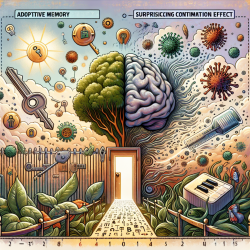Social anxiety disorder (SAD) in children is a significant concern that can severely impact their well-being and everyday life. Recent research by Asbrand et al. (2020) titled "Biased Perception of Physiological Arousal in Child Social Anxiety Disorder Before and After Cognitive Behavioral Treatment" sheds light on the nuanced interplay between physiological arousal and cognitive behavioral therapy (CBT) in treating childhood SAD. This blog aims to distill the key findings of this study and provide actionable insights for practitioners to enhance their therapeutic approaches.
Key Findings from the Study
The study involved 64 children diagnosed with SAD and 55 healthy controls (HC) aged 9 to 13 years. The children participated in the Trier Social Stress Test for Children (TSST-C) to assess their physiological and subjective responses to social stress before and after a 12-week group CBT program. The primary outcomes measured were heart rate, skin conductance, and interoceptive accuracy (IAc), along with self-reported perception and worry about physiological arousal.
Before Treatment
- Children with SAD exhibited heightened perception and worry about their heart rate and skin conductance compared to HC children, despite no significant differences in actual heart rate.
- The study found no significant differences in interoceptive accuracy (IAc) between children with SAD and HC children.
After Treatment
- Contrary to expectations, children in the CBT group reported increased perception and worry about physiological arousal after treatment.
- Objective measures such as heart rate and skin conductance remained unchanged post-treatment.
Implications for Practitioners
The findings highlight the complexity of treating childhood SAD, particularly concerning physiological arousal. Here are some recommendations for practitioners based on the study:
1. Addressing Perception and Worry
Given that children with SAD report heightened perception and worry about physiological symptoms, it is crucial to incorporate components in CBT that specifically target these biases. Techniques such as interoceptive exposure, which is commonly used in treating panic disorders, could be beneficial.
2. Psychoeducation
Psychoeducation should emphasize the distinction between actual physiological arousal and perceived symptoms. Helping children understand that their perception of arousal may not always align with reality can reduce worry and improve coping strategies.
3. Long-term and Intensive Treatment
The study suggests that longer and more intensive CBT programs might be necessary to achieve significant changes in physiological awareness and biased perception. Practitioners should consider extending the duration of therapy beyond 12 weeks and incorporating more exposure sessions.
4. Further Research
The study calls for further research to explore whether the increased perception and worry post-treatment are temporary or indicative of an adverse intervention effect. Understanding this phenomenon better can help refine therapeutic approaches and improve outcomes for children with SAD.
In conclusion, while CBT remains a cornerstone in treating childhood SAD, this study underscores the need for a more nuanced approach that addresses the specific biases in physiological perception. By incorporating these insights, practitioners can enhance their therapeutic strategies and create better outcomes for children.
To read the original research paper, please follow this link: Biased Perception of Physiological Arousal in Child Social Anxiety Disorder Before and After Cognitive Behavioral Treatment.










